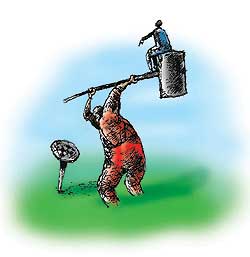 In a land where all economic decisions are fundamentally political ones, the Beed supposes, glumly, that one ought not be surprised by the cabinet decision to dissolve all local bodies. Despite several calls made by multilateral and bilateral agencies, thinkers and virtually all sane Nepalis, the government went on to commit an act that, apart from making their own cajoling of voters easier, does not serve any rational purpose. The public good is clearly a dispensable commodity for this partyless political dispensation.
In a land where all economic decisions are fundamentally political ones, the Beed supposes, glumly, that one ought not be surprised by the cabinet decision to dissolve all local bodies. Despite several calls made by multilateral and bilateral agencies, thinkers and virtually all sane Nepalis, the government went on to commit an act that, apart from making their own cajoling of voters easier, does not serve any rational purpose. The public good is clearly a dispensable commodity for this partyless political dispensation. ]After the Local Self Governance Act was enacted, the local bodies had started making a lot of progress in deciding what they wanted and how they wanted to do it. The frustrations of the people at the centre started becoming increasingly evident as these local bodies began to show that they could convince the donor community of their style of functioning and vision. The emphasis on decentralisation has been getting stronger and everyone is pretty much convinced that for Nepal, empowering local level units can deliver in suitable form what a top-heavy centralised planning process envisions.

There are more immediate, urgent ramifications of this decision, too. The anti-terrorist funding and allied development packages are now looking a little uncertain-what funding agency would trust a government that has neither an identity, nor any power. Even the interim government surprisingly continues with a bloated cabinet, and with government appointees at the local body level, one wonders where governance shall come from.
Nepal has, all of a sudden, become a lot less interesting to the outside world, aid-wise. The Beed is willing to wager almost anything that we won't see most of the promised funds flow into Nepal before some semblance of governance is restored. And when that will happen, your guess is as good as mine. As for getting more pledges from donors, forget about it. What this fluid situation means is that, on the one hand, security costs are difficult to fund, and on the other, the present stagnation of economic growth is going to continue. Any talk in the near future of increases in foreign investments or tourism, or any other kind of growth will be ridiculous.
Perhaps, Nepal wants to prove Murphy's Laws true. While His Majesty is trying to create an impression on the Chinese government and businessmen alike by talking about the economic decentralisation of Nepal, the government has pulled the rug from under his, and every other sensible person's feet by doing away with the basis of all such talk. The king must have been considerably embarrassed in the last month in India and China when matters of governance and politics arose.
Even as Nepal pleads for more assistance, we have done away with the most efficient vehicle to use it. As anxious Nepalis wait for some sign that this present situation could change for the better, this vacuum in governance at the local level will take away what little confidence they have in the political system in place here. And people who were slowly but surely giving up their sympathy for the Maoists and their cause will certainly be given pause while reconsidering their opinions.
The good stories that Nepal has been able to tell the world about the last decade or so have been about the success of forest-user groups and self-help income-generating groups, both of which have been possible due to a devolution of the powers of decision-making and implementation to the local level. The legislation to facilitate decentralisation was another landmark for Nepal, as many developing countries were still struggling to put into place precisely this. In terms of the future economic scenario, the devolution of political power seemed possible.
The current government has successfully proved that it can be very efficient. Unfortunately, this efficiency is limited to steps that reverse the economic processes in place that made one retain some hope for this country even at the worst of times. Hopefully they will realise their mistake and, if not actually hang their heads in shame and flagellate themselves in public, they will at least look now to damage control. In this case, that can be done by nothing short of ensuring that the local polls do, in fact, take place with the parliamentary elections.



